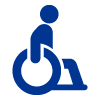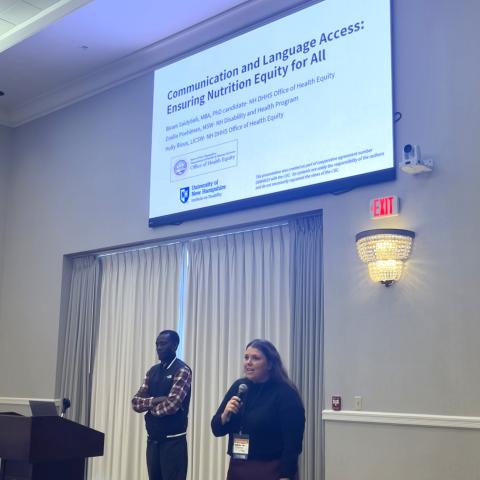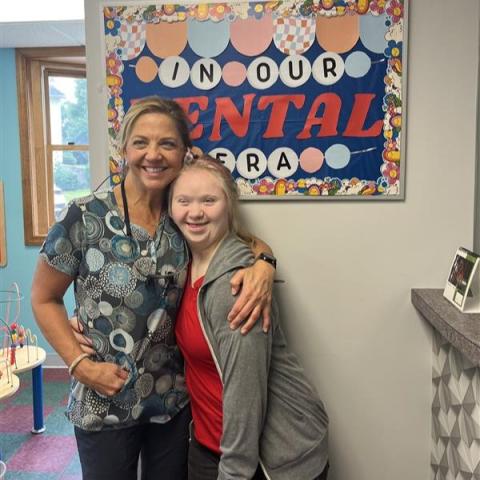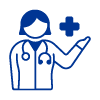August 1, 2024- July 31, 2025
The NH Disability and Health Program (NH DHP) focuses on seven strategies the Centers for Disease Control and Prevention identified. This summary reports on the program activities for Year 4 of the current funding cycle (8/1/2024-7/31/2025) organized by strategy.
DHAWG meetings

DHAWG members with disabilities


Strengthening Partnerships with NH DHHS

Biram Saidybah, NH DHHS Office of Health Access, and Emilia Poehlman at the NH Nutrition Equity Summit in October 2024.
This year, NH Disability and Health Program (NH DHP) continued to strengthen its partnership with the NH Department of Health and Human Services (DHHS) by building new connections and expanding collaborative efforts. We worked with the Tobacco Prevention and Cessation Program (TPCP) to improve the accessibility of their outreach materials. The TPCP team invited our team to participate in quarterly Tobacco Free Network’s meetings to bring a disability perspective to state level tobacco efforts. We also connected TPCP with Special Olympics NH (SONH), resulting in their participation in the SONH Healthy Athletes event. Another department we collaborated with at NH DHHS was the Office of Health Access (OHA). NH DHP co-presented with OHA at the NH Nutrition Equity Summit to share communication strategies that reach the whole community. We look forward to seeing how our partnership with NH DHHS will continue to grow and create new opportunities.
Partnership Spotlight: Disability and Health Advisory Work Group (DHAWG)
Insights from the DHAWG play a critical role in guiding program priorities and expanding our impact.
The Disability and Health Advisory Work Group (DHAWG) is a dynamic group of individuals with professional and personal experience with disability. Many DHAWG members are employed by various statewide and regional public health, healthcare, and disability service organizations across the state. The DHAWG meets virtually every month and considers a specific topic related to DHP. This year, some of the topics DHAWG members provided guidance and insight on included mental health, disseminating a training for oral health providers, and a brainstorm regarding our evidence-based intervention (Living Well in the Community or LWIC). One of our DHAWG members went above and beyond to connect us with a new partner that hosted a workshop of LWIC.
The DHAWG meetings have created an opportunity for shared community. At DHAWG meetings, members regularly give brief presentations to share updates on their current work. This helps us learn from one another and build valuable connections. As one member shared, their involvement in the DHAWG “gives me information and resources I can share with other groups I am connected to.” These presentations also spotlight the incredible work our members are doing across the state; it can lead to new ideas, partnerships, and momentum.
Training Launched

Milestones

Technical Assistance Requests Completed

What is a milestone? Progress toward addressing barriers, gaps, and needs as acknowledged in the 2022 health and wellness needs assessments. This groundwork, ideally, should lead to meaningful, sustainable Policy, System, and Environmental changes.
Closing Gaps in Oral Health Care Through Professional Training
Through feedback from the DHAWG and participating in the ABLE NH Oral Healthcare Task Force, NH DHP identified that a lack of accessible dental providers have created a healthcare gap for people with disabilities in NH. In response, the team collaborated with a dental hygienist and disability advocates with lived experience to develop a new healthcare module training for oral health professionals. Building upon the success of the online Responsive Practice training modules, the NH DHP team launched Responsive Practice: Providing Effective Oral Health Care to Adults with Disabilities in the spring of 2025.
The training is online and on demand. It addresses the four pillars of a “responsive practice”:
Dentists and dental hygienists can receive one hour of free continuing education. NH DHP looks forward to sharing this opportunity with oral health professionals across the state who want to ensure their care is accessible and inclusive of people with disabilities.
Oral Health Team

Megan Henly, Katie Phillips and Alex Beauchner.

Angela Boyle and Emma Ledger

Megan Henly, Thomas Jimino, and Angela Boyle.
Spotlight: Northeast Passage PATH Program
Partnering to Improve Community Access and Health Outcomes
NH DHP is proud to continue its partnership with Northeast Passage (NEP), for a fourth year. This ongoing collaboration supports NEP to expand their community-based recreation therapy program, PATH. The PATH model improves access to home and community environments for adults with mobility disabilities, ultimately supporting better long-term health outcomes.
12
Individuals served

Visions for increased health and wellbeing

Recreational Therapy sessions

Healthcare Provider Training
Administer and evaluate a training for healthcare providers on accessible preventive health care



Showcasing Training Impact and Opportunities at APHA 2024
Members of the NH Disability and Health Program (DHP) team conducted qualitative thematic analysis of over 3,000 of the national Responsive Practice participant responses to:
- What suggestions do you have to improve the training?
- What future topics would you like to learn about health care for people with disabilities?
The team summarized strengths and weaknesses of the existing training modules and future training topics related to disability and health. One of the identified strengths of the training was the inclusion the perspectives of people with disabilities. Many participants shared that they wanted the training to be more interactive and include opportunities to check for understanding. This data can be applied to the development of future healthcare education. For instance, the team that developed the new Responsive Practice oral health module applied what we learned from this analysis. In November, the NH DHP team shared a summary of this analysis at the American Public Health Association 2024 Annual Meeting in Minneapolis, MN.

Emilia Poehlman at the 2024 American Public Health Association Annual Meeting in Minneapolis, MN
Linkage Project
Implement and evaluate a demonstration project to link adults with IDD to preventive health care and health promotion programs in their community



Area Agency Collaboration Expands Program Reach
This year, the NH Linkage team expanded its outreach efforts with area agencies across the state. This included attending in-person meetings, developing targeted Health Linkage Program materials for case managers, and cultivating relationships with area agency staff. The impact of these efforts can be seen through program enrollment. In Year 3, seven of the 28 enrollments (25%) were referred through an area agency, compared to 24 of 52 (46%) in Year 4. One of the staff members from Community Bridges, the area agency that serves the Capital Area, recognized the benefit of working with the Health Linkage Program staff to better serve her clients. You can hear from Ashley Kennedy in the following video.



DHAWG Connection Sparks New Partnership with Camp Allen
DHAWG member Dr. Lisa Plotnik wears many hats in our community, including physician at Dartmouth-Hitchcock and board president at Camp Allen. After brainstorming about opportunities to host more Living Well in the Community (LWIC) workshops at a winter DHAWG meeting, Dr. Plotnik considered Camp Allen as a potential collaborator to facilitate LWIC workshops and introduced the NH DHP team to the camp staff. The Camp Allen staff identified overlap between the Living Well in the Community (LWIC) curriculum and an existing camp program called “Life Camp.” Camp Allen implemented an abridged LWIC workshop in May with thirteen campers.


Identified partners for change

Small Change, Big Impact: Accessibility at Gather
In the fall, NH DHP was contacted by Gather, a local food pantry on the seacoast that serves over 10,000 people monthly. Gather’s request was to review their registration form and provide accessibility recommendations. NH DHP provided several opportunities for improvement and encouraged the organization to add an accommodation question to their form. By adding an accommodation question, Gather is providing the opportunity for individuals with disabilities to communicate their needs and receive the support they need. People with disabilities are more likely to experience food insecurity. Ensuring that disabled people can access services and programs at food pantries is critical. With this change, Gather took an important step toward providing inclusive services.



Equipping Partners to Reach the Whole Community
Throughout Year 4, the NH Disability and Health Program (DHP) engaged with community partners to share disability accessibility and inclusion strategies through training, presentations, and technical assistance. The program collaborated with organizations including the Southern New Hampshire Area Health Education Center, Wentworth Douglass Hospital, and Foundation for Healthy Communities to deliver presentations to healthcare workers, public health professionals, and hospital staff.
These presentations are incredible opportunities to highlight actionable steps to improve access for everyone, including people with disabilities. Beth Wheeler, Senior Director for Population Health & Equity at the Foundation for Healthy Communities, shared about the impact of the NH DHP facilitating presentations for two hospital peer groups in the fall, “We have received quite a bit of positive feedback - our members are interested in better understanding how they can provide supportive and inclusive environments for all people and this is one area where they felt they needed to bolster their efforts." The NH DHP team is eager to expand these efforts by continuing to share important insights and promote disability inclusion across the state.
Looking Ahead
Year 4 goals, objectives, and partnerships
- Partnerships: NH DHP plans to strengthen new and old partnerships by offering technical assistance to ensure programs and services are available to all.
- Needs Assessment: NH DHP will conduct outreach to dentists and dental hygienists to share about the new virtual healthcare provider training. NH DHP will also continue to support Northeast Passage’s PATH program, which has proven to be impactful in bridging the gap in unmet health needs for adults with mobility limitations.
- Healthcare Provider Training: NH DHP will identify events and opportunities to market to the training to NH-based healthcare providers.
- Linkage: The NH Linkage Team, in collaboration with the NH DHP team, will maintain relationships with area agencies to ensure case managers are familiar with the Health Linkage Program as an opportunity to improve the health and wellness of the individuals they work with.
- Evidence-Based Intervention: NH DHP will explore workshops with the three identified partners; Camp Allen, Granite State Independent Living, and Granite YMCA.
- PSE: NH DHP recognizes the importance of strong partnerships to implement meaningful, sustainable changes. The program will continue the coalition building conducted in the previous years of this grant to encourage PSE changes in oral health, food security/nutrition, and transportation. NH DHP hopes to leverage work conducted on the NCHPAD project to identify PSE changes for the Granite YMCA.
- Dissemination: NH DHP will leverage local conferences as an opportunity to educate health professionals and support them in identifying organizational changes that support them in better serving the whole community, including people with disabilities.
Acknowledgements
This publication was supported by cooperative agreement number DD000025 with the U.S. Centers for Disease Control and Prevention (CDC). Its contents are solely the authors' responsibility and do not necessarily represent the views of CDC.
The program staff at the University of New Hampshire Institute on Disability (UNH IOD) gratefully acknowledge the many individuals, families, advocates, agencies, and organizations whose work has paved the way for current public health efforts, programs, and initiatives.
This summary was prepared by Emilia Poehlman, MSW, Hannah Pease, MPP, and Megan Henly, PhD at the UNH IOD. Thanks to DHP’s Kathy Bates, Toni Sumner-Beebe, and Karen Volle for their input and contributions toward program activities. Design and website support were provided by Kate Filanoski-Russell.
Alternative formats of this summary are available. Please contact disability.health@unh.edu to request an alternative format.
Thanks also to the Disability and Health Advisory Work Group who were active in Year 4:
- Jennifer Baker, NH Family Voices
- Emily Bird, NH Division of Public Health Services
- Carol Conforti-Adams, Sunset Hill Education Institute
- Kelly Ehrhart, Disability Advocate
- John Fenley, Disability Advocate
- Tiffany Gladu, Granite State Independent Living
- Cindy Lafond, Granite YMCA
- Kelly Main, NH Bureau of Developmental Services
- Jennifer McLaren, MD, Dartmouth-Hitchcock
- Martha McLeod, New Futures / New Hampshire Alliance for Healthy Aging
- Lisa Plotnik, MD, Dartmouth-Hitchcock
- Brittany Potvin, MPH, Disability Advocate
- Laura Remick, North Country Health Consortium
- Deb Ritcey, MPA/HA, Granite State Independent Living
- Isadora Rodriguez-Legendre, MSW, NH Council on Developmental Disabilities
- Bob Scholz, MS, LMHC, Center for START Services
- Valarie Tetreault, MAPP, Community Bridges
